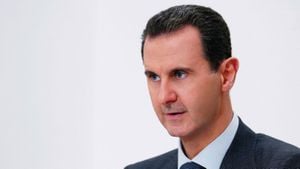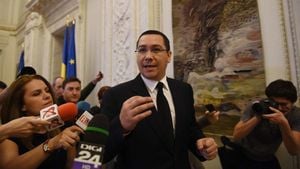Romania's pro-European parties have recently united to form a coalition government aimed at sidelining far-right nationalists, marking a significant shift in the political dynamics of the country. The coalition came together following the parliamentary elections held on December 1, where the leftist Social Democratic Party (PSD) emerged with the most seats, leading to discussions with several other parties.
This coalition includes the center-right National Liberal Party (PNL), the reformist Save Romania Union party (USR), and the ethnic Hungarian UDMR party. The objective behind this coalition is not only to form a stable government but also to counter the rising influence of ultranationalist and pro-Russian factions, which took over one-third of the parliamentary seats during the elections.
Interestingly, these political ties have been forged against the backdrop of the recently annulled presidential race. This election witnessed the surprising ascent to prominence of far-right candidate Calin Georgescu, who initially captured the first round. His candidacy raised eyebrows not only due to his far-right affiliations but also because of the allegations of electoral irregularities and possible interference from Russian entities. Unfortunately, concerns over these matters reached the point where Romania's Constitutional Court decided to annul the presidential elections entirely, prompting the need for re-elections.
Following the parliamentary elections, the newly-formed coalition hastened discussions on building their governing program. According to their joint statement, the parties intend to create a roadmap focusing on developmental policies and necessary reforms. They aim to target the pressing concerns of the Romanian public, emphasizing fiscal responsibility, budgetary discipline, and minimizing bureaucracy.
Elena Lasconi, the USR party leader, highlighted another priority shared by the coalition partners: the need for budget cuts and streamlined government operations. This pivot toward fiscal discipline speaks volumes about their approach to governance, particularly as the current budget deficit, reportedly the largest within the European Union, looms over their terms at 8% of GDP. Observers and analysts express skepticism about how these diverse parties, who have previously clashed on various issues, will come together to implement comprehensive economic strategies necessary for addressing the deficit.
The coalition also indicated plans to back one unified pro-European candidate for the next presidential elections, aiming to fortify their position against the backdrop of rising ultranationalist sentiments. Currently, the future of Georgescu’s candidacy remains uncertain as legal inquiries are underway.
Meanwhile, with the term of the outgoing President Klaus Iohannis coming to its end, he retains the responsibility to appoint the new prime minister, setting the stage for the incoming government as the parliamentary session approaches its deadline on December 21.
The political scenario, marked by accusations of undue influence and the pressing need to restore public confidence, poses not just challenges but opportunities for the new coalition. Their success will hinge on aligning often disparate party priorities to address the needs of citizens amid the turbulent political climate.



